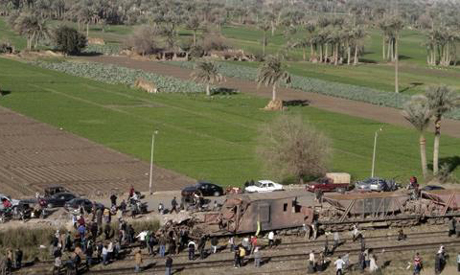 Nineteen Central Security Forces conscripts were killed and 120 injured when a train carriage derailed minutes before midnight on Monday in the town of Badrashin in Giza, the transport ministry said on Tuesday morning.
Nineteen Central Security Forces conscripts were killed and 120 injured when a train carriage derailed minutes before midnight on Monday in the town of Badrashin in Giza, the transport ministry said on Tuesday morning.
The 12-carriage train, which was carrying 1328 conscripts, was en route to Cairo from Upper Egypt when one of its cars - carrying around 200 soldiers - derailed, hitting a goods train parked outside a storage depot.
As police carried out a rescue operation, witnesses said some soldiers battled for their lives under the rubble of the derailed carriage.
A security official, who spoke on condition of anonymity, told Ahram Online that many of the wounded were in a critical condition, raising the possibility of a rise in the death toll during the next few hours.
Many ambulances ferried the injured to a nearby hospital, while officials started arriving at the scene around three hours after the accident took place, Ahram Online’s Mohamed Nada said.
Hussein Zakareya, head of Egypt’s Railway Authority, said the derailed carriage hit another cargo train after it went off the rails.
On Tuesday morning, Talaat Abdullah, the prosecutor-general, ordered the burial of the 19 victims and opened an official investigation into the accident.
Brotherhood points finger at Mubarak-era corruption
Saad El-Katatni, head of the Muslim Brotherhood's Freedom and Justice Party and former speaker of parliament, has extended his condolences to the families of the 19 soldiers who died in the accident.
El-Katatni said recurrent train accidents were proof of the almost total collapse of infrastructure caused by corruption during the Mubarak era.
The accident was a signal for everyone to end political conflicts and cooperate to rebuild the country, he added.
"We cannot waste time. The Egyptian people are in need of work and accomplishments, and we cannot spend time with arguments and conflicts."
Salvation Front takes aim at Morsi administration
However, Egypt's opposition figures has condemned the government's response to the accident.
Prominent critic Hamdi Qandil and member of the main opposition movement, the National Salvation Front (NSF), said that he expects the country will continue to witness similar deadly train accidents due to the lack of government accountability.
"The railway situation [in Egypt] has deteriorated to an extent that it cannot be fixed. The whole system needs to be changed," Qandil told the Al-Ahram Arabic news website.
Qandil pointed out that even the Italian embassy had been warning its citizens in Egypt against riding trains.
In the absence of any statement or acknowledgement from the presidency thus far, Qandil said: "... a statement does not matter at this point. The young men are dead."
Mohamed ElBaradei, the NSF's co-founder and prominent reform campaigner, expressed his remorse for those who were killed, saying via his twitter account that the real tragedy of Egypt is not about the affiliation of its rulers but rather their inability to manage the country.
"Egypt is kneeling down every day," ElBaradei said in reference to the president's promise that Egypt "will never kneel down" in the face of any challenge.
One train crash after another
The deadly incident comes less than two months after 51 school children were killed when their bus was hit by a train as it drove through a railway crossing in the Assiut village of Manfalout, Upper Egypt.
In the same month, November 2012, at least three Egyptians were also killed and more than 30 injured in a train crash in Fayoum, another city south of Cairo.
Dozens of train accidents have plagued the country during the past decade. In 2002, in one of the most deadly incidents, 373 passengers were killed after their train caught fire. Seven years later, at least 30 people died in another accident on the same railway.
Egyptians have long complained about poor levels of safety and maintenance on the out-of-date railway system. The government vowed on numerous occasions to upgrade the ageing trains, but little was accomplished in that regard.
“We have to admit that the railway system is decaying. We will carry out investigations to know whether the accident happened because of defects in the train or rails or because of other reasons,” transportation minister Hatem Abdel-Latif, who has been in office for 10 days, told Al-Ahram’s Arabic website.
Abdel-Latif recently replaced Rashad El-Metiny, who resigned in the wake of the Assiut school bus tragedy, in a partial cabinet reshuffle carried out by Prime Minister Hisham Qandil.



